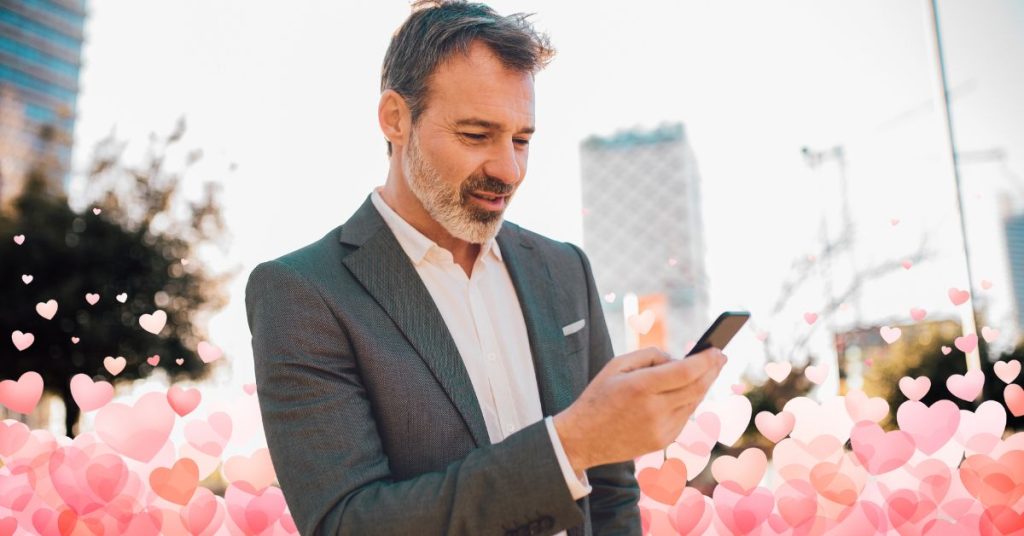There is a stereotype about women 40 and over. It’s that they are past their prime, kinda like the expiration date on a milk carton, only the date on the container says, “Best by aged 30, but preferably under.”
Infuriating? Yes. Wholly untrue? Also yes. Dating in your 40s, 50s, and beyond has a narrative that people have long latched onto: “It’s too late,” or “Your best years are behind you.” Society loves to box people in, like once you hit a certain age, your dating life is just supposed to bow out gracefully, and you should get a cat (also a stereotype; the single cat lady). Well, surprise! None of these are close to the truth.
The reality is that dating at this stage of life means you know exactly who you are and what you want, and you’re not about to waste precious time on what you don’t.
If you take one thing away from this, let it be that just because you’re not in your 20s or 30s doesn’t mean you have to hang it up in the romance department. That’s patriarchal BS. The myth that love has a sell-by date is exactly that—a myth. People of any age fall in love, and, a lot of the time, it can even be better when you’re older.
Why is that? Because you’ve lived more, you’ve experienced more, and you’re probably not hung up on the same insecurities you might have had when you were younger. Dating in your 40s and up is not about playing head games; it’s about real connection. And who says passion is only for the young? Love doesn’t care about your date of birth—it happens when it happens.
We are going to get into all things dating in your 40s and beyond. Like how you’ve got maturity in spades, you know yourself and are confident with who you are, and you have self-awareness on your side. Maturity, confidence, and self-awareness? Sounds like a pretty solid foundation for love, no matter how old you are!
Why Dating Over 40 and Beyond is Different
Dating in your 40s and beyond isn’t a continuation of what you did in your 20s or early 30s—it’s an entirely new ballgame. For most, getting older comes with a certain confidence that is born from life experience, and what that confidence means is a change in what actually matters to you when you’re dating. Sure, you still want to look your best to impress, but it’s less of the superficial stuff; you want to find someone who is an equal partner.

Priorities Change: Emotional Compatibility Over Superficial Traits
When we are younger, dating tends to be driven by external factors—looks, social status, or even how a person fits into a certain idea of what you should want. We’re not as smart in our teens and 20s! But by the time you’ve hit the big 4-0, that perspective goes out the window. You’ve probably been through enough in your past relationships to know what makes one last—and it isn’t how someone looks in a dress or a suit, but how they make you feel and if they’re good to you.
Emotional compatibility—things like common values, mutual respect, and understanding each other’s emotional needs—take more importance over looks. You’re not searching for someone based on superficial boxes; you want someone who can actually relate to you on a real level.
And it’s actually a nice change! You’re no longer influenced by qualities that don’t really matter in the long run or trying to fit someone into a fantasy version of a relationship. You want the real thing, where both people show up as they are, and sparks fly on the inside.

Life Experience Means More Intentional Connections
By the time you hit your 40s, you’ve lived through a lot—career changes, possibly marriage, and a number of serious relationships, and had your heart broken, too. All this experience changes how you look at dating. Instead of dating casually just to see where things go, you’re likely more intentional about who you spend your time with.
You know who you are, and that lucidity gives you a feeling of purpose in relationships. You’ve got a much better understanding of your own boundaries and what you want and need from a romantic partner, which makes it easier to know when someone is compatible.
And the connections you do make tend to be more meaningful because you’re not really worried about timelines or societal expectations. You’re concentrating on quality over quantity, and that makes a huge difference in how you relate to potential partners!

Juggling Responsibilities: Career, Family, Health
Life in your 40s often comes with a full (sometimes overflowing) plate. Between your career, family obligations, and personal health, you’re dealing with so much more than you might have been in your 20s. And this definitely changes your perspective on dating.
For one, finding the time to date is harder—you might have kids to take care of, a super demanding job, or even aging parents you help out with. This means that when you do carve out time for a relationship, it’s usually because it’s something you genuinely want—not because you feel pressured by anyone else.
Having these additional responsibilities also means that relationships have to be more flexible. You’re looking for someone who understands that your time and energy are divided between responsibilities and who’s okay with that. And that’s the beauty of dating later in life—you’re more likely to find someone who’s in a similar boat, someone who gets that life is complicated and can still find happiness in being together when it happens!
So yes, of course, dating in your 40s and beyond is different. It’s about real connection, emotional depth, and finding someone who fits into your life as it is, with all its coordinated chaos. You’re not searching for perfection—you’re looking for someone who feels right.
Common Challenges and How to Overcome Them
Re-entering the dating world in your 40s, 50s, or beyond comes with a few challenges, but none of them are insurmountable. Common ones are the fear of rejection, negotiating modern dating apps, or unpacking emotional baggage from past relationships.
But here’s the sunny side—you are most def not alone in facing these struggles, and with the right frame of mind and a little guidance, they’re totally manageable. Below are some of the common challenges people face while dating later in life and how you can snuff them out.

Fear of Rejection or Being ‘Out of Practice’
Look, dating in your 40s isn’t a cakewalk for most people, especially If you’ve been out of the scene for a while; maybe because of a divorce or a long-term relationship ending, it’s normal to feel unsure and even like you’re a little rusty. The whole dating process has changed since you were last actively doing it—there are tons of online dating apps, texting and communication etiquette, and a whole new set of rules that didn’t exist the last time you were dating.
And then there’s the fear of rejection. Yes, rejection always feels awful, but it can feel a lot worse when you’re older because it taps into insecurities about aging. You might wonder if you’re still attractive to others or worry that people won’t want to date someone your age.
These negative thoughts can be paralyzing, but the thing is to remember that rejection is part of dating for everyone, regardless of age. It does NOT reflect your worth. Honestly, it’s just a sign that someone wasn’t right for you—and thank goodness you found out before you wasted any precious time!
How to Overcome It
- Start small: If the idea of a fancy dinner date feels intimidating, baby step yourself into it with low-pressure things like getting coffee or meeting for a drink. Baby steps can help you build up your confidence!
- Reframe rejection: Instead of looking at it as a personal failure, recognize that it’s just part of the process and it happens to us all.
- Practice: The more you date, the easier it is! Think of it like getting back into the gym after a long break. The first few workouts might be terrible, but with time, you find your rhythm again.

Dealing with Past Relationship Baggage
When you’re in your 40s, you’ve probably had your fair share of serious romantic relationships. Maybe you’ve been through a painful breakup or a divorce, and those experiences leave scars. Emotional baggage from the past is a heavy weight to carry with you, and if it’s not addressed, it can affect new relationships.
Bringing unresolved feelings and issues into a new relationship is comparable to moving into a new house but never unpacking any boxes. All of that clutter will get in the way of enjoying the space you’re trying to create. For a majority of people, the fear of getting hurt again keeps them from opening up in new relationships. It’s a protective instinct, but it can prevent you from building a strong and meaningful connection.
How to Overcome It
- Acknowledge your baggage: You can’t move forward until you’ve recognized and dealt with what’s holding you back. It helps to talk with a therapist or counselor to get to the bottom of and process any residual feelings. Therapy will help you understand the patterns in your past relationships and give you the tools so you can date in the healthiest way.
- Set boundaries: Being aware of your emotional triggers is always important, so setting clear boundaries about what you will and won’t tolerate in relationships will safeguard you from repeating old mistakes while also making sure you’re not closing yourself off.
- Be patient with yourself: Healing isn’t linear, and it’s okay if you need more time before committing to dating again. Take all the time you need and go at your own pace.

Navigating Online Dating and Modern Apps
If you’re in your 40s or beyond, online dating could feel like an alien planet. Yes, people still meet each other via IRL setups, work, and meet-cutes, but it’s mostly done on dating apps nowadays. You might feel like poor E.T.—left behind in a foreign and possibly hostile environment if you have no idea why there are so many different dating apps or how they work.
We get it–it is a lot. But trust us, online dating is one of the best ways to meet new people. You just have to go toward it with the right mindset and a few practical tips.

Tips for Online Dating Over 40
- Choose the right app: Not all dating apps are the same, and different platforms cater to different needs. Apps like Bumble and Hinge are popular for people looking for good connections, and platforms like eharmony are geared toward serious, long-term relationships. There are also niche platforms for older singles, like SilverSingles, and ones for single parents, like Stir and SingleParentMeet.
- Be real: This cannot be understated—do not try to curate a profile that you think will appeal to everyone—just be yourself. Use recent photos and be super clear about what you’re looking for. If you’re upfront, you’re more likely to attract someone who’s compatible with you.
- Set realistic expectations: Not every match on a dating app is going to turn into a love story, and that’s par for the course. Keep an open mind, and try not to get discouraged if you don’t meet “The One” immediately.
- Be cautious: Online dating comes with hazards, so it’s important to prioritize your safety—online and offline. Always meet in public places, let a friend know where you’re going, and trust your instincts if something feels weird. Be wary of catfish and scammers; dating profiles with no pics or little info are a red flag, as are people who ask you for money or any sensitive personal info.

Building Self-Confidence and Developing a Positive Frame of Mind
It is totally normal to feel insecure about dating, especially if you haven’t done it for a while or are worried about how you have changed over time. But confidence is attractive no matter your age. Confidence comes from knowing exactly who you are, embracing your strengths, and being comfortable with where you’re at in life.
The trick to building up self-confidence in dating is realizing that you bring a lot to the equation. By your 40s, you’ve experienced a lot—good and bad—that has made you the person you are today. That’s a huge advantage. You have more self-awareness, emotional intelligence, and wisdom than you did in your 20s, and these are all qualities that make you a great romantic partner!
How to Build Confidence
- Focus on self-care: Confidence starts with how you feel about yourself. Make time for things that improve your mood and energy, whether that’s exercise, spending time with friends, or doing hobbies you love.
- Change your mindset: Instead of seeing dating as something you have to do, look at it as something that’s fun and exciting! A date is a chance to meet someone new.
- Celebrate your uniqueness: You’ve lived a full life, and that’s something to be proud of. Own the fact that you’re not the same person you were in your 20s—you’ve grown, evolved, and are ready to share your hard-won knowledge and strength with another soul.
Dating in your 40s and beyond does have some challenges, but it’s also an incredibly rewarding experience when done with the right mindset. Fear of rejection, emotional baggage, and negotiating the online dating world are hurdles, but none of them are insurmountable. With patience, self-awareness, and a willingness to go outside your comfort zone, dating later in life can be wonderful.
Tips for Successful Dating Over 40
Dating in midlife brings a very different energy compared to when you were younger—you’ve lived in ways that have shaped you, and that adds depth to the relationships you are looking for.
It’s a time to welcome everything that makes you distinct and fully lean into the opportunity for strong connections without the pressures that usually come with dating in your 20s or 30s.
Below, we talk about how you can navigate dating in your 40s, 50s, and beyond with confidence and a positive outlook!

Embrace Your Individuality
The best thing about dating in midlife? You know who you are. You’ve been through enough to have a strong sense of self, and there’s no need to apologize for it. If there’s ever a time to embrace your individuality, it’s now.
When you’re younger, there’s pressure to fit into certain molds or meet other people’s expectations. By the time you’re in your 40s or beyond, you can throw that mindset right out of the window.
Your life experiences, your passions, your quirks—that’s what makes you you, and that’s what you should lean into when dating. Don’t try to fit into someone else’s idea of what’s desirable—concentrate on finding someone who appreciates and loves the real you.
It’s also important to recognize that this stage of life is different from earlier phases. Your priorities have changed, and what you’re looking for in a partner now might not be the same as it was in your 20s.
Maybe you’re not worried about starting a family or finding someone to build a life with from scratch—you’ve already done that. At this point, maybe you’re just looking for companionship, fun, and someone who adds to your life rather than completes it.
This kind of realization means you can look at dating with a fresh perspective. You’re in no rush. You’re looking for someone who fits into your life as it is rather than trying to mold your life around someone else.

Be Open to New Experiences and People Outside Your ‘Type’
We know we keep saying this, but it’s important to keep an open mind. Almost all of us have a certain “type” we want to be with, but if you’ve been dating for years with little to no success, it might be time to broaden your “type” horizons. Being open to dating people who don’t fit all of the criteria you think you need in a partner can turn into unexpected and great connections!
Think about it this way: Your idea of a perfect match in your 20s might have been based on superficial things like looks, status, or a specific set of interests. But now that you’re older, it’s easier to see that real compatibility comes from the same values, emotional maturity, and the ability to have good conversations.
So be open to meeting people who bring different perspectives into your life, even if they don’t immediately seem like your usual type.
It’s also important to push yourself out of your comfort zone when it comes to activities and experiences. Sign up for that class, go to a wine tasting, or join a social group. Not only does this give you the chance to meet new people, but it also keeps life interesting. Dating in midlife is about exploring new avenues and staying curious about the world around you!

Communication and Honesty Are More Important Than Ever
Let’s not sugarcoat it—communication is everything. And in midlife, it’s even more important because who has time for games? Not you! You’ve probably had enough relationships to know that clear, open communication is what makes a partnership run like a well-oiled machine. There’s no need to beat around the bush or play coy when you know what you want. Being upfront about your needs, desires, and expectations will save you a lot of time and heartache in the end.
It’s also important to listen—actively listen—to your date. Ask questions that go beyond the surface level. Instead of just talking about what you do for a living, talk about why you do it, what your passions are, and what makes you feel alive. Real conversations help build the kind of trust that turns into stronger connections.
Honesty also extends to your past. By the time you’re dating in midlife, it’s likely you’ve been through a lot—whether that’s a divorce, the end of a long-term relationship, or any other life-changing event. Being open about your experiences (without unloading too much, too soon—that’s trauma dumping, don’t do that) is a way to build trust. Most people in this age group are in a similar boat and will appreciate your honesty.

How to Balance Personal Life, Career, and Dating
One of the hardest parts of dating at this age is that you are probably balancing a career, kids, aging parents, and your personal stuff. Adding dating on top of all of this may feel like too much, but it doesn’t have to be!
- Prioritize Your Time: This is where you need to be intentional. Look at your schedule and figure out when you can realistically fit in time for dating. It might be a weekend brunch or a quick coffee after work. The key is to make time for it, even if it’s just a little. You don’t have to go on dates every week, but making room and time for new connections is important if you want to build a relationship.
- Set Boundaries: Just because you’re dating doesn’t mean you have to let it take over your life. Be upfront about your boundaries, especially if you have other responsibilities. If you’re balancing a career or family, make sure your date understands that while they’re important, they’re not your whole world. Healthy relationships are built on mutual respect for each other’s time and commitments.
- Be Flexible: Dating doesn’t have to fit into the “dinner and movie” box. Be open to unconventional date ideas that work with your schedule. Maybe you can’t do a late-night dinner, but a weekend midday date or a lunch break meetup might fit into your life. Being creative with how you spend time together can actually make the dating experience more fun and less stressful.
- Don’t Rush: Remember, this is not a race. Whether it takes months or even a year to find someone you click with, it’s all part of the process. Take your time, and don’t ever feel pressured to fast-track a relationship. The right connection will happen when it’s meant to.
The Importance of Self-Love and Personal Growth
Before you just hop into a new romance, you have to focus on yourself first. There’s no way around it—investing time in your own growth and well-being means healthier and better connections. By getting to know yourself and making self-love a priority, you’re not only improving your own happiness, but you’re also setting a higher standard for the relationships you let into your life!

Investing in Yourself Before a New Relationship
One of the biggest mistakes people make is getting into a new relationship before they’ve done the work they need to do on themselves. It’s lovely to think that someone else will fill the gaps in your happiness or give you the validation you’re missing, but nobody can do that for you—at least not in any kind of sustainable way. Relying on someone else to make you feel whole tends to result in unhealthy patterns, like constantly seeking reassurance or always fearing abandonment.
Self-love is about knowing your worth, feeling confident in who you are, and being able to meet your own emotional needs. When you’ve invested in yourself, you enter relationships from a place of strength rather than neediness. You’re not looking for someone to fix or complete you—you’re looking for someone to share an already fulfilling life with.
It can also help to take time to think about your past relationships. What worked? What didn’t? By investing in your own personal growth, you give yourself the chance to understand your own patterns, heal old wounds, and break out of any unhealthy cycles. That way, you’re bringing your best self into any future relationship.

How Self-Care and Independence Improve Relationship Quality
Self-care goes way beyond physical wellness, long bubble baths, or spa days. It’s about mental and emotional well-being, too. When you prioritize self-care, you’re teaching yourself that your needs matter. You’re less likely to settle for a relationship that doesn’t meet your standards because you already know how to meet your own emotional needs.
This independence actually strengthens relationships. When both partners have their own lives—whether it’s career goals, personal hobbies, or friendships outside the relationship—it creates a healthy dynamic where neither person is overly dependent on the other for happiness. Independence builds respect, and partners are less likely to feel suffocated or burdened by each other. There’s something nice about having your own world but still choosing to share part of it with someone else.
On top of that, taking care of yourself makes you a better romantic partner. You’re more emotionally available, patient, and present in your relationship because your own cup is full. It’s hard to give to others when you’re running on empty. Self-care also makes you more resilient, so you can handle the ups and downs of a relationship without feeling like you can’t keep your head above water.

How Therapy or Coaching Helps You Heal and Move Forward
Sometimes, personal growth takes a little extra help. Therapy and coaching aren’t just for people who are dealing with traumatic or mental health issues. They’re amazing tools for anyone looking to understand themselves better, heal from past hurts, or simply become a little more self-aware.
Therapy is incredibly helpful for processing past relationship trauma or emotional baggage. Maybe that tough breakup or divorce took more out of you than you first thought, and those unresolved feelings are affecting how you look at new relationships.
A therapist will help you work through these emotions and give you a fresh perspective and healthier ways to cope. Therapy is about finding the tools to handle life’s challenges so you’re not dragging old emotional baggage into something new.
Coaching, on the other hand, can be more future-focused and action-oriented. A life coach can help you set personal goals, develop better communication skills, and boost your confidence in dating and relationships.
Coaching can give you practical strategies to make progress, whether it’s about negotiating new relationships or improving existing ones. Both therapy and coaching let you look inward so you can grow as a person before sharing your life with someone else.
Ultimately, both therapy and coaching give you the insight and tools you need to create healthier, more fulfilling relationships moving forward. They help you clear out the emotional clutter so you can go into new relationships with clarity and confidence.
Conclusion: It’s Never Too Late for Love
Age is just a number, and love is blind to it—romantic feelings don’t pay any mind to what’s on your birth certificate. It doesn’t matter if you’re in your 40s, 50s, or older; connection and companionship are just as important, if not more so!
At this stage of your life, you have a way better understanding of exactly who you are, which means you can connect with other people on a stronger level. The beauty of love later in life is that it usually comes with fewer expectations and fewer strings attached—and when all of those things are out of the picture, it makes room for truly meaningful relationships.
We’ll leave you with this: it’s important to be open and patient. Finding love doesn’t follow a strict schedule, and it might find you in ways you hadn’t thought about. Maybe it’s a romantic relationship, or maybe it’s a close friendship that brings you happiness and support.
Either way, love is always worth the wait. So put yourself out there as much as you can, have fun meeting new people, and know that it is never too late for you to find love—or for it to find you!
Don’t listen to people who say you are past your prime; keep your chin up, and remember that every chapter of life has room for a new paragraph about love!




